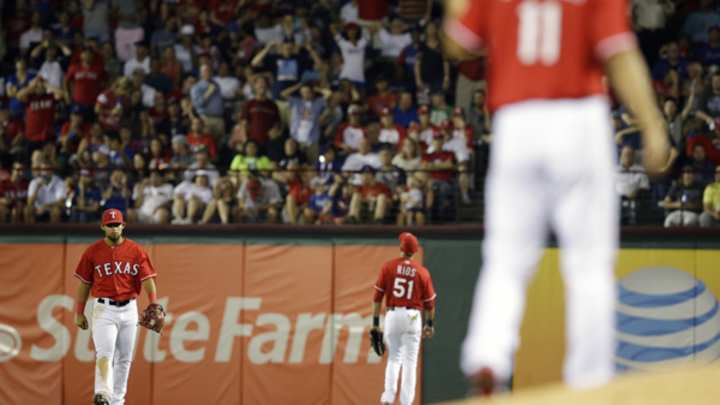Oh no Yu didn't: MLB errs by changing error to hit in Yu Darvish's near-no-hitter

Yu Darvish's one-hitter is now a two-hitter, as an error by Alex Rios was changed to a hit. (Tony Gutierrez/AP)
Score one for historical revisionism: David Ortiz did indeed break up Yu Darvish's bid for a no-hitter last Friday night, but not via his two-out, ninth-inning single. Instead, the ruling on the flyball that he hit with two outs in the seventh inning that landed untouched between rightfielder Alex Rios and second baseman Rougned Odorhas been changed from an error on Rios to a hit for Ortiz.
For practical purposes, this doesn't alter much, other than boosting Big Papi's batting average and removing Darvish from the exclusive company of Bill Burns (1908 and 1909) and Dave Stieb (1988 and 1989), the only other pitchers to fall one out short of a no-hitter more than once. And to be fair, similar situations have been scored both ways. Rule 10.12(a) allows the official scorer to "charge an outfielder with an error if such outfielder allows a flyball to drop to the ground if, in the official scorer’s judgment, an outfielder at that position making ordinary effort would have caught such fly ball," but far more often than not, such balls are ruled hits instead of errors.
Here is the play in question:
[mlbvideo id="32740507" width="600" height="336'" /]
At the time that official scorer Steve Weller ruled an error, he cited Rule 10.12 as his reason for doing so, and because a no-hitter was in progress, called the Elias Sports Bureau to see if they agreed with his call (they did). After the game, he told pool reporter Evan Grant:
In my judgment, when the ball goes up in the air, I felt like the second baseman or rightfielder under normal effort could have caught the ball. Under the rule, 10.12(a)(1), it clearly states that a flyball that lands -- that's allowed to hit the ground, that in the judgment of the official scorer under normal effort could be caught -- you're to award an error on the play.
Via the Boston Globe's Pete Abraham, Weller said his decision was based on Rios calling for the ball:
https://twitter.com/PeteAbe/status/466663684056813569
Calling the play in question as an error was certainly permissible under the rules, though without a no-hitter on the line, it's quite likely that it would be scored a hit. Had the no-hitter been completed, nobody would have reversed a decision to change the error to a hit at this point.
Ortiz felt that the play should have been scored a hit; via ESPN Dallas' Richard Durrett, he said after the game, "I know I hit a ball that was supposed to be caught… The guy is throwing a no-hitter. We all understand, but when it comes down to the rules of the game, that's a hit. That's the rule that we all know and that's the rules that the game had for more than 100 years." Teammates concurred, and Ortiz said he believed that the league would overturn the ruling — which it has.
Retroactively changing a scoring decision isn't uncommon. Upon review by the league, hits and errors, runs and unearned runs get changed back and forth a handful of times a year. On Tuesday, MLB announced that a May 2 single by the Rockies' Jorge De La Rosa off the Mets' Zack Wheeler had been changed to an error, with the ensuing two runs becoming unearned. A nation yawned.
Still, there's something unsettling about this particular change, even if it's by the book, mainly because it invalidates the experience of what everyone witnessed (myself included, fumbling for my iPhone in a bar once I found out the game had headed to the ninth). Regardless of rooting interest, the vast majority of the 45,000-plus fans on hand at Globe Life Park in Arlington and the millions more watching via television or internet had some emotional stake in the outcome. Either they wanted Darvish to complete the perfect game (which it was before the error) or no-hitter, or they wanted it broken up to prevent the Red Sox from being embarrassed. With this ruling, MLB has arguably embarrassed all concerned parties — Darvish and his teammates included — by telling them that the rollercoasters they rode during the remainder of the game were for naught. Those goosebumps? Fuggedaboutit. They were inappropriate. To paraphrase one of my favorite lines from Homicide: Life on the Streets:
"If this conversation is about a no-hitter, we ain't havin' it."
"We're not?"
"And if we're not havin' this conversation, there's no no-hitter."

Jay Jaffe is a contributing baseball writer for SI.com and the author of the upcoming book The Cooperstown Casebook on the Baseball Hall of Fame.